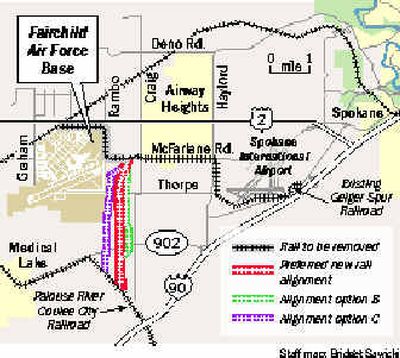Rail relocation plans spur controversy

Local government and economic development officials have been working two years on a project to relocate a West Plains railroad spur.
But while businesses along the proposed Geiger Spur route have been part of the process since the beginning, many residential neighbors along the proposed three-mile stretch of track were informed of the plans just weeks ago.
They say that they’re being railroaded and that a Wednesday open house about the project is just window dressing. The train already is headed down the track, they say, and they are powerless to stop it.
“Right now, they’re saying it’s only going to run twice a week, but what if it brings more business like they’re planning for?” asked Devon Rauenzahn, who lives just 650 feet from the proposed line.
Rauenzahn said she’s worried that noise will disturb her family and horses and that sparking rail cars will increase fire danger.
The five-mile Geiger Spur was set to be abandoned by the Burlington Northern and Santa Fe Railway because of low use, deteriorating condition and the cost of moving it off Fairchild Air Force Base, which wants the rail line relocated for security reasons.
Rauenzahn and her rural neighbors wonder why they weren’t informed about the project earlier.
“We’ve had all kinds of information in the newspaper, on TV and the radio,” said Spokane County Engineer Ross Kelley, who added that work to secure funding was the first step before notifying neighbors.
“You have to start someplace,” Kelley said.
Tammie Williams, a county environmental program administrator, said she recently sent about 200 notices to nearby property owners, inviting them to the open house.
Williams said the project is only in the preliminary stages.
“We haven’t even done the design,” she said.
But the county has identified a preferred route as well as two alternatives. All would move the line off Fairchild property and link it to the Palouse River Coulee City Rail Line to the south.
“It’s like they’ve already made up their mind,” said Rauenzahn.
Geiger Spur boosters point to the jobs that moving the rail line would save. About 10 companies and 300 jobs depend on the rails.
And improving the rail spur and ensuring its future could bring more companies and more jobs, said Jon Eliassen, president and chief executive officer of the Spokane Area Economic Development Council.
“The EDC’s role in all this has been to support and facilitate the meetings and make sure everything was moving forward and to maintain the jobs,” said Eliassen.
According to an economic impact study commissioned by the EDC, improving and relocating the line could bring an additional $300 million a year to the local economy.
That report also declares that property owners along the proposed route are “mildly to very supportive.”
That may be true of some owners but not all of those within hearing distance of the rail cars and train whistles.
“Our property values are going to go down. I don’t care if they say it’s not,” said Dal Lent, who lives just yards from the proposed route.
The line would run right behind Dee Konen’s house. She said she worries that a train-caused fire could wipe her out.
But fire risk is minimal, said Williams.
BNSF has donated the spur to the county. The relocation and refurbishment project would cost about $6.5 million, including design and right-of-way costs.
The U.S. Department of Defense has contributed $500,000, and the state has set aside about $3.5 million for the project.
“I don’t think people will notice it as much. I can understand why people would be concerned because you don’t want to live by a busy railroad,” Eliassen said of the line, which he said would be very low-volume and very low-speed.
But Rauenzahn isn’t convinced.
“It’s not that I don’t want this to happen. I want Airway Heights to have their economic development, but give us some consideration,” she said. “We moved out here for the peace and quiet. If there had been a railroad, we would never have moved here.”